|
|
|
Sort Order |
|
|
|
Items / Page
|
|
|
|
|
|
|
| Srl | Item |
| 1 |
ID:
147435


|
|
|
|
|
| Summary/Abstract |
The oil product pricing mechanism is a regulation system that was introduced in the late 1990s to control the oil product prices in China. For the first time to our knowledge, we provide an empirical evaluation of this regulation system, with a particular focus on its role in China's macroeconomy. Based on monthly data between 2000 and 2013, we find that: (i) contrary to the general public's impression, the mechanism is ‘fair’ overall in the sense that it responds to the rise and fall of international oil price symmetrically; (ii) the effect of the mechanism on the Chinese economy, however, is very limited; and (iii) the limited effect of the mechanism holds for different levels of regulation during the studied period, suggesting that potential deregulation may have little impact on the economy.
|
|
|
|
|
|
|
|
|
|
|
|
|
|
|
|
| 2 |
ID:
083234
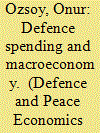

|
|
|
|
|
| Publication |
2008.
|
| Summary/Abstract |
This study uses a six-variable vector autoregressive (VAR) model and analyses the relationship between defence spending as a percentage of GNP, government budget as a percentage of GNP, total deficit as a percentage of GNP, the GNP growth rates, inflation rates, and government budget deficit as a percentage of GNP for the case of Turkey from 1933 to 2004. The impulse response functions (IRFs) are also derived and Granger causalities among the variables estimated. The results support the short-run causality between defence spending and economic growth.
|
|
|
|
|
|
|
|
|
|
|
|
|
|
|
|
| 3 |
ID:
082894


|
|
|
|
|
| Publication |
2008.
|
| Summary/Abstract |
This paper evaluates the usefulness of business sentiment indicators for forecasting developments in the Chinese real economy. We use data on diffusion indices collected by the People's Bank of China for forecasting industrial production, retail sales and exports. Our bivariate vector autoregressive models, each composed of one diffusion index and one real sector variable, generally outperform univariate autoregressive models in forecasting one to four quarters ahead. Similarly, principal components analysis, combining information from various diffusion indices, leads to enhanced forecasting performance. Our results indicate that Chinese business sentiment indicators convey useful information about current and future developments in the real economy. Moreover, the results could be seen as support for the reliability of the official data on the real economy, as both survey and real sector data seem to reflect the same underlying economic dynamics.
|
|
|
|
|
|
|
|
|
|
|
|
|
|
|
|
| 4 |
ID:
159042


|
|
|
|
|
| Summary/Abstract |
Analyzing monetary policy in China is not straightforward because the People's Bank of China (PBoC) implements policy by using more than one instrument. In this paper we use a Qual VAR, a conventional VAR system augmented with binary policy announcements, to extract a latent indicator of tightening and easing pressure, respectively, for China. The model acknowledges that policy announcements are endogenous and summarizes policy by a single indicator. The Qual VAR allows us to study the impact of monetary policy in terms of unexpected changes in these latent variables, which we identify using sign restrictions. We show that the transmission of monetary policy impulses to the rest of the economy is similar to the transmission process in advanced economies in terms of both output growth and inflation despite a very different monetary policy framework. We find that bank loans are not sensitive to policy changes, which implies that window guidance is still a necessary policy tool. We also find that the impact of monetary policy shocks is asymmetric in terms of asset prices, that is, the asset price reactions differ in their sensitivity to tightening shocks and easing shocks, respectively. In particular, an easing of monetary conditions boosts stock prices while a tightening shock leaves stock prices unaffected. This shows that monetary policy is not a suitable tool to stabilize asset prices, which raises implications for financial stability and macroprudential policy.
|
|
|
|
|
|
|
|
|
|
|
|
|
|
|
|
| 5 |
ID:
086258


|
|
|
|
|
| Publication |
2009.
|
| Summary/Abstract |
This paper investigates the macroeconomic effects of terror by using a novel data set from Turkey for the period of 1987:1 to 2004:4. This research contributes to the literature by controlling for the possible non-linear and endogenous relationship between political conflict and economic activity. Empirical evidence from both linear and non-linear models confirms that terrorism has a large significant negative impact on economic activity. Finally, the results from the non-linear model show that the impact of terrorism on the aggregate economy is more severe during expansionary periods, and that the impact of economic activity on terrorism is significant only in recessionary periods.
|
|
|
|
|
|
|
|
|
|
|
|
|
|
|
|
| 6 |
ID:
120625


|
|
|
|
|
| Publication |
2013.
|
| Summary/Abstract |
We investigate the transmission mechanism of monetary policy in China over the past decades with emphasis on the post-Asian crisis period. A factor-augmented VAR method is used to study the effectiveness of monetary policy instruments in stabilizing the Chinese economy. We find that repo rate, benchmark lending rate, and a market-based monetary stance have little impact on the Chinese economy, and are only mildly effective when the exchange rate is more market-determined. The non-market-based measures of People's Bank of China, such as growth rates of total loan and money supply, are effective in adjusting the real economy and price level. Given the slow pace of exchange rate reform, China is likely to continue employing non-market-based policies in the near future.
|
|
|
|
|
|
|
|
|
|
|
|
|
|
|
|
| 7 |
ID:
128042


|
|
|
|
|
| Publication |
2014.
|
| Summary/Abstract |
This study offers an investigation of the relationship between defense and social spending in the People's Republic of China. In particular, three consecutive questions are answered here. Does a warfare-welfare tradeoff exist in China's budgetary allocation? Is it positive or negative? What is the causal direction involved? By applying a vector autoregression analysis for the period of 1952-2006, this study finds a unidirectional crowd-out effect going from defense to social spending.
|
|
|
|
|
|
|
|
|
|
|
|
|
|
|
|
| 8 |
ID:
166574
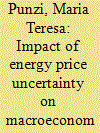

|
|
|
|
|
| Summary/Abstract |
This paper evaluates the macroeconomic implications of energy price volatility through the lens of a dynamic stochastic general equilibrium (DSGE) model in an open economy. The model develops a small open economy in which households consume energy products and firms use energy as productivity inputs, where the country is so small that it needs to import energy, the price of which is determined abroad. Whereas positive energy price shocks cause an economic slowdown due to higher costs for consumers and firms, energy price volatility shocks generate an increase in GDP in the short-run and a reversal in the long-run. These findings are empirically supported by estimates from a Panel VAR model applied to 10 Asian economies, where energy price volatility has a positive impact on GDP in the short-run. Moreover, the paper finds that increasing demand or supply uncertainty also affect energy prices, with amplified fluctuations relative to a model that abstracts from energy. Market volatility leads households to cut consumption for precautionary savings motives, which in turn increases investment.
|
|
|
|
|
|
|
|
|
|
|
|
|
|
|
|
| 9 |
ID:
098773
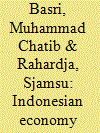

|
|
|
| 10 |
ID:
152763
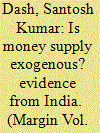

|
|
|
|
|
| Summary/Abstract |
Against the backdrop of the claim that the rising growth rate of money is one of the major factors behind India’s recent bout of elevated and sticky inflation, this article asks: Is money supply exogenous or endogenous, and can it predict future inflation. This question is investigated using the monetarist framework of inflation. In the empirical analysis of data spanning from 1970–71 to 2009–10, the results of both the monetarist and the error-correction models suggest that money supply accounts for inflation in India. There is also the presence of an error-correction mechanism among money, inflation and output. However, a monetarist equation does not tell anything about causality. Thus, the vector autoregression (VAR) method is used to detect the direction of causality between money supply and the inflation rate. Findings from Granger causality tests suggest weak evidence of inflation (Granger) causing money supply. As a robustness check, we estimate VAR models using quarterly data and, further, using core inflation. The results of the causality tests from the quarterly data, the impulse response function and forecast error variance decomposition suggest that money supply is weakly endogenous.
|
|
|
|
|
|
|
|
|
|
|
|
|
|
|
|
| 11 |
ID:
100955
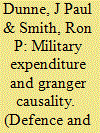

|
|
|
|
|
| Publication |
2010.
|
| Summary/Abstract |
A large literature has used tests for Granger (1969) non-causality, GNC, to examine the interaction of military spending with the economy. Such tests answer a specific although quite limited question: can one reject the null hypothesis that one variable does not help predict another? If one can reject, there is said to be Granger causality, GC. Although the limitations of GNC tests are well known, they are often not emphasised in the applied literature and so may be forgotten. This paper considers the econometric and methodological issues involved and illustrates them with data for the US and other countries. There are three main issues. First, the tests may not be informative about the substantive issue, the interaction of military expenditure and the economy, since Granger causality does not correspond to the usual notion of economic causality. To determine the relationship of the two notions of causality requires an identified structural model. Second, the tests are very sensitive to specification. GNC testing is usually done in the context of a vector autoregression, VAR, and the test results are sensitive to the variables and deterministic terms included in the VAR, lag length, sample or observation window used, treatment of integration and cointegration and level of significance. Statistical criteria may not be very informative about these choices. Third, since the parameters are not structural, the test results may not be stable over different time periods or different countries.
|
|
|
|
|
|
|
|
|
|
|
|
|
|
|
|
| 12 |
ID:
083225


|
|
|
|
|
| Publication |
2008.
|
| Summary/Abstract |
Considering the importance of military expenditures on political and economical success of a government, this empirical study analyzes the relations between political stability, economic growth and military expenditures. Based on the theoretical model developed by Blomberg (1996), the vector autoregression analyzes results for a democratic country and indicates the significance of military expenditures on political stability and private sector investment decisions.
|
|
|
|
|
|
|
|
|
|
|
|
|
|
|
|
| 13 |
ID:
170085


|
|
|
|
|
| Summary/Abstract |
This paper studies whether monetary transmission in China is asymmetric. While researchers have found an asymmetric transmission in the US and other economies, China offers a specific rationale for asymmetries: the presence of state-owned enterprises (SOEs) with preferential access to financing. To study the consequences of SOEs for monetary policy transmission, we differentiate between expansionary and restrictive policy shocks and argue that SOEs generally suffer less from a policy tightening and benefit more from a policy easing. Based on sector-specific macroeconomic time series and a large firm-level data set, we provide evidence of a systematic and sizeable asymmetry in the transmission of monetary policy shocks in China. The nature of the asymmetry is consistent with the notion of explicit or implicit government guarantees of SOEs and has consequences for the adjustment of aggregate variables. In contrast to other central banks, the People's Bank of China seems able to “push on a string”.
|
|
|
|
|
|
|
|
|
|
|
|
|
|
|
|
| 14 |
ID:
166555
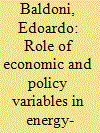

|
|
|
|
|
| Summary/Abstract |
Energy saving is a major policy objective worldwide and in the EU in particular. Evaluating the convenience of energy-efficient investments, however, is complex. This paper aims to apply stochastic Life Cycle Costing to assess the economic value of energy-efficient building retrofitting investments. The proposed approach investigates how macroeconomic variables affect such an evaluation by explicitly taking into account their interdependent stochastic nature. Consequently, the economic evaluation of an investment is itself stochastic thus expressing both its expected value and its inherent uncertainty and risk. On this basis, an illustrative case-study is presented, where alternative designs of the energy-saving intervention are compared and a sensitivity analysis performed to identify the determinants of the LCC outcome and of its variability. In terms of policy implications, a tool providing a sounder evaluation of the convenience of such investments can suggest when and to what extent incentives may be appropriate to facilitate these investments and what possible financial instruments could be put forward in order to reduce the associated risk.
|
|
|
|
|
|
|
|
|
|
|
|
|
|
|
|
| 15 |
ID:
132758


|
|
|
|
|
| Publication |
2014.
|
| Summary/Abstract |
This paper analyses the impact of global economic activity and international crude oil prices on natural gas import prices in three major natural gas markets using the panel cointegration model. It also investigates the shock impacts of the volatility and the increase and decrease of oil prices on regional natural gas import prices. The results show that both global economic activity and international crude oil prices have significant long-term positive effects on regional natural gas import prices. The volatility of international crude oil prices has a negative impact on regional natural gas import prices. The shock impact is weak in North America, lags in Europe and is most significant in Asia, which is mainly determined by different regional policies for price formation. In addition, the response of natural gas import prices to increases and decreases in international crude oil prices shows an asymmetrical mechanism, of which the decrease impact is relatively stronger.
|
|
|
|
|
|
|
|
|
|
|
|
|
|
|
|
|
|
|
|
|